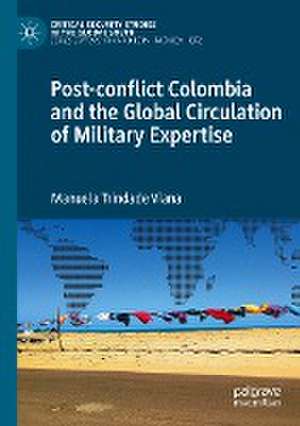Post-conflict Colombia and the Global Circulation of Military Expertise: Critical Security Studies in the Global South
Autor Manuela Trindade Vianaen Limba Engleză Paperback – 16 mai 2023
| Toate formatele și edițiile | Preț | Express |
|---|---|---|
| Paperback (1) | 251.60 lei 3-5 săpt. | +25.38 lei 7-13 zile |
| Springer International Publishing – 16 mai 2023 | 251.60 lei 3-5 săpt. | +25.38 lei 7-13 zile |
| Hardback (1) | 257.08 lei 3-5 săpt. | |
| Springer International Publishing – 15 mai 2022 | 257.08 lei 3-5 săpt. |
Preț: 251.60 lei
Nou
Puncte Express: 377
Preț estimativ în valută:
48.14€ • 52.46$ • 40.57£
48.14€ • 52.46$ • 40.57£
Carte disponibilă
Livrare economică 02-16 aprilie
Livrare express 19-25 martie pentru 35.37 lei
Preluare comenzi: 021 569.72.76
Specificații
ISBN-13: 9783030961053
ISBN-10: 3030961052
Pagini: 276
Ilustrații: XIV, 276 p. 1 illus.
Dimensiuni: 148 x 210 x 20 mm
Greutate: 0.39 kg
Ediția:1st ed. 2022
Editura: Springer International Publishing
Colecția Palgrave Macmillan
Seria Critical Security Studies in the Global South
Locul publicării:Cham, Switzerland
ISBN-10: 3030961052
Pagini: 276
Ilustrații: XIV, 276 p. 1 illus.
Dimensiuni: 148 x 210 x 20 mm
Greutate: 0.39 kg
Ediția:1st ed. 2022
Editura: Springer International Publishing
Colecția Palgrave Macmillan
Seria Critical Security Studies in the Global South
Locul publicării:Cham, Switzerland
Cuprins
Ch 1 Introduction.- Ch 2 The construction of Colombia as a 'problematic country'.- Ch 3 The success and its 'monsters'.- Ch 4 The circuit, the 'military professional' and the limits of the discourse of modernization.- Ch 5 Counterinsurgency and the 'expert-soldier'.- Ch 6 The Transnational making of military savoirs.- Ch 7 Conclusion.
Notă biografică
Manuela Trindade Viana is Adjunct Professor and Coordinator of the Undergraduate Program in International Relations at the Institute of International Relatins of the Pontifical Catholic University of Rio de Janeiro, Brazil.
Textul de pe ultima copertă
By challenging more common analyses that point to the existence of a "post-conflict scenario" in Colombia and those that resist the narrative of "success", both of which operate within the logic of presence/absence of violence, this book proposes instead that we think of "post-conflict" in terms of the transformation of the rules on the use of violence. The analysis unfolds in two parts: the first explores the conditions of possibility of the Colombian “success story” and the web of criteria legitimizing the “success”, as well as the silencing mechanisms allowing for Colombia to circulate internationally as a formula to be replicated in other parts of the world; the second, focuses on the historicization of the mechanisms through which new rules are transmitted among the professionals of the public force, specifically the transformations of military schools and training centers in Colombia from times of “war” to “peace”. The author argues that key to this transformation is a unique discursive articulation around the “military professional” which slides from “citizen-soldier” to “expert-soldier”.
Manuela Trindade Viana is Adjunct Professor and Coordinator of the Undergraduate Program in International Relations at the Institute of International Relatins of the Pontifical Catholic University of Rio de Janeiro, Brazil.
Caracteristici
Proposes instead that we think of "post-conflict" in terms of the transformation of the rules on the use of violence Focuses on the historicization of the mechanisms through which new rules are transmitted Explores the conditions of possibility of the Colombian “success story”





